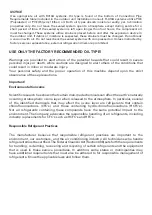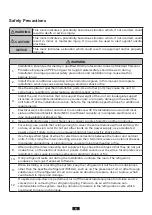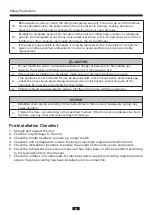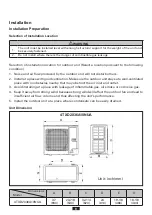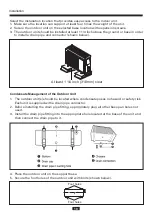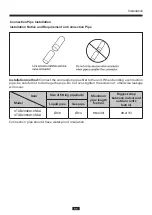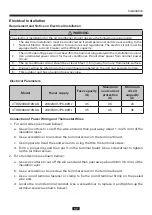
5
Safety Precautions
WARNING
1.
Installation should performed by a qualified HVAC professional. Industry Standard Personal
Protective Equipment (PPE) and gear for height related safety should be worn during
installation. Improper personal safety precautions and installation may cause death or
serious injury.
2.
Install the air conditioner according to the instructions given in this manual. Incomplete
installation work may cause water leakage, electrical shock or fire.
3.
Use the supplied or specified installation parts. Use of other parts may cause the unit to
come loose, resulting in water leakage, electrical shock or fire.
4.
Install the unit in a location that can support the weight of the unit. An inadequate support
structure or incomplete installation may cause injury or property damage in the event the
unit falls off of the installation location. Refer to the installation specifications for additional
requirements.
5.
Electrical work should be carried out in accordance with the installation manual and local,
state and National Electric Code (NEC). Insufficient capacity or incomplete electrical work
may cause electrical shock or fire.
6.
Use a dedicated power circuit. Never use a power supply shared by another appliance.
7.
For wiring, use a cable that is long enough to cover the entire distance without splicing. Do
not use an extension cord. Do not put other loads on the power supply; use a dedicated
power circuit. Failure to do so may cause abnormal heat, electric shock or fire.
8.
Use the specified types of wires for electrical connections between the indoor and outdoor
units. Firmly clamp the interconnecting wires so their terminals receive no external stresses.
Incomplete connections or clamping may cause terminal overheating or fire.
9.
After joining the interconnecting and supply wiring, shape the cables so that they do not put
undue force on the electrical covers or panels. Install covers over the wires. Incomplete cover
installation may cause terminal overheating, electrical shock, or fire.
10.
If any refrigerant leaks out during the installation, ventilate the room. The refrigerant
produces a toxic gas if exposed to flames.
11.
When installing or relocating the system, keep the refrigerant circuit free from substances
other than the specified refrigerant (R410-A), such as air. The presence of air or other foreign
substances in the refrigerant circuit can cause an abnormal pressure rise or rupture, which
could result in injury and damage.
12.
If a system pump-down is performed, turn off the associated equipment and close service
valves prior to removing the refrigerant piping. Failure to do so will introduce non-
condensables in the system, causing abnormal pressure in the refrigeration cycle which
could lead to injury and damage.
WARNING
This mark indicates a potentially hazardous situation which, if not avoided, could
result in death or serious injury.
CAUTION
This mark indicates a potentially hazardous situation which, if not avoided, could
result in minor or moderate injury. It may also be used to alert against unsafe
practices.
NOTICE
This mark indicates a situation which could result in equipment and/or property
damage.



